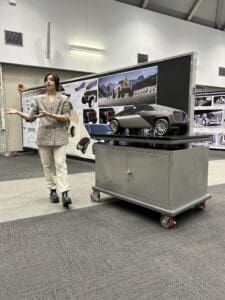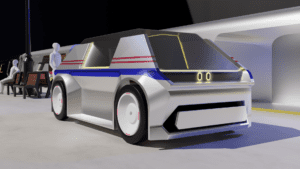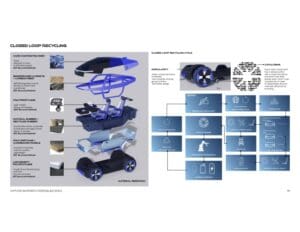College for Creative Studies Celebrates 20 Years of Educational Partnership with American Chemistry Council
March 14, 2024
For the past 20 years, American Chemistry Council has partnered with College for Creative Studies (CCS) in educational design studios. These sponsored projects have allowed countless CCS students the opportunity to participate in creative, research-based assignments within real-world design parameters, all while interacting with American Chemistry Council experts.
“Our longstanding partnership with CCS has helped forge a new era in transportation design focused on eliminating plastic waste in the environment,” Gina Oliver, Senior Director Durable Markets Advocacy at American Chemistry Council said. “ACC’s vision for sustainability is at the core of everything ACC and our members stand for and together through our work with CCS and the automotive industry, we are working to create the innovative sustainable materials necessary for a circular automotive industry. This transformative industry change must begin first and foremost with automotive design. CCS is a preeminent school in transportation design and for the past 20 years, its students have been a huge part of the sustainable future that ACC and its members are working to achieve in this industry. These visionary budding automotive designers are truly the future of automotive sustainability and circularity.”
Founded in 1872, American Chemistry Council (ACC) is an industry trade association for American chemical companies, based in Washington, D.C. ACC represents more than 190 companies engaged in the business of chemistry, advocating for the people, policy and products of chemistry that make the United States the global leader in innovation and manufacturing.
In the most recent sponsored studio this past fall, undergraduate and graduate Transportation Design students designed an electric vehicle for the year 2050. Designs were required to feature plastics and polymer composite solutions that demonstrate a fully circular economy from design through end-of-life. Students also had to articulate the benefits and enabling technologies that contributed to the sustainable materials chosen for their design.
At the final presentation, students showcased innovative designs tackling future mobility, deconstruction and sustainability challenges.
Oliver believed the final student designs were at a top level. “These young designers embraced the recognition that in order to keep automotive durable materials out of our environment at end-of-life, we need to make sweeping industry changes that begin first and foremost at the point of design. This year’s project outcomes were nothing short of incredible – honestly the best in our 20 years with CCS. These talented designers are the key to a low-carbon, circular automotive industry future.”
Graduate Transportation Design student Arturo Barrera Rodriguez presented UMobi, a mobility infrastructure system that included a two-seater electric vehicle connected to the UMobi recycling system. A standout selection of unusual sustainable materials –biodegraded carrots and recycled carbon fiber– showed Barrera Rodriguez’s depth of research and application. He also created a digital cataloging system of each component of the UMobi system using a coding system where individual components of the vehicle could be scanned at the disassembly plant with a material make-up list. This will allow individual materials to be easily disassembled and sorted for recycling.
Undergraduate Transportation Design student Benjamin Pollitz introduced his final project, Citroën, a compact truck made with sustainable plastic construction. The electric truck is designed to transport goods and supplies between population centers and communities at their outskirts. The design included advanced recycling technology –an enzyme-based process that breaks down petroleum-based plastics into monomers– resulting in components that can then be used to make new virgin plastics.
Shannon McPartlon, Executive Director of the Office of Partnerships at CCS is grateful for the long-standing partnership with American Chemistry Council Plastics Division. “Their commitment to nurturing and supporting the next generation of designers is truly remarkable. Over the past two decades, we have worked closely with ACC to shape a shared vision for classroom projects, creating an inspiring environment where students are encouraged to explore material innovations. This partnership has consistently challenged students to envision a better future for all through their creative designs within the transportation industry.”
To learn more about the Undergraduate Transportation Design program at CCS please visit https://www.ccsdetroit.edu/academics/undergraduate-programs/transportation-design/.
To learn more about the Graduate Transportation Design program at CCS please visit https://www.ccsdetroit.edu/academics/graduate-programs/.
To learn more about American Chemistry Council please visit https://www.americanchemistry.com/.




